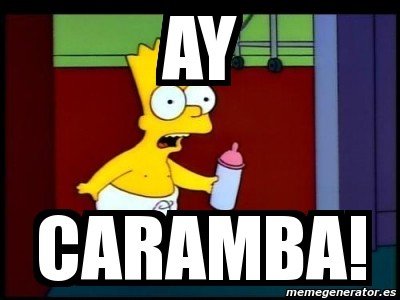
A few days back I was wondering why there are not many Spanish classes here on Stemit, and since I’m a native Spanish speaker why not helping foreigners who are trying to learn it as an extra language? So, I decided to start writing some articles to help all those who are learning Spanish and support them on their learning journey.
I didn’t know what I should talk about at first, after pondering about it for a while, I took the decision of explaining some of the main doubts that I see confuse most Spanish learners. I chose three confusing topics that my friends who are learning Spanish were very puzzled about. I think this may clear up some of your doubts and if you already know them It never hurts to brush up on the skills. I hope this can help and make your Spanish better! So, let’s go to the first common doubt.
The differences between: “Hay”, “Ahí” and “ay”
These three words might be very confusing (sometime even for native speakers) because they sound very similar. But once you get the hang of it, it will be pretty easy.
Hay= There is

This basically explains the existence of something, exactly like “There is” for example: “Hay un plato en la mesa” which means “there is a plate on the table”.
Ahí= There
This is an adverb, and means “there” by itself. So you can say for example “Ahí está la pelota” which means “the ball is there”.

Ay= Oh! / Ouch!
This is an exclamation and has several uses. People say “Ay!” either when they get suddenly impressed or when they get hurt.
For example:
“¡Ay, me asustaste!” meaning “Oh! You scared me”
“¡Ay, pisé un lego!” meaning “Ouch! I stepped on a Lego” (Which could be really painful)

“Saber” and “conocer”
This one is pretty easy. “Saber” means to have knowledge about something and “conocer” means to know someone or to express familiarity with a person.

Examples for “Saber”:
- Yo sé matemática= I know mathematics.
- Ellos saben cantar= They know how to sing.
Examples for “Conocer”:
- Yo la conozco= I know her.
- Ellos se conocen= They know each other.

“Chao” and “Adiós”
Despite you could use them interchangeably, maybe it would sound weird for Spanish speakers if you say “Adiós, nos vemos en una hora” because it literally means “Good bye, see you in one hour” and as you can see it doesn’t sound very natural, because you use “Adiós” when you are not going to see that person anymore or for a very long time. “Chao” is the most common farewell used in Spanish, but you can also use ¡Hasta luego! :)

Well, This is all for today, as this is my first Spanish class on Steemit, I chose the subjects, but from now on, I will make more articles clearing up your doubts. Let me your questions in the comments box and I will happily answer them in my next article.
Thanks for reading!
Special thanks to my friend @whynotdoit for encouraging me to make my first Spanish lesson :D
If you want to practice your conversational Spanish you can join our new channel on Discord and learn with us: https://discord.gg/2CwmqvP
Images:1,2,3,,4,5.

I guess there is a lot of people that not speak Spanish that want to learn some.
I will look for your next learning to speak Spanish post
Because I no habla españolThis was a smart post to start @Ralk98
Kindest regards
@Gyldenhorn
Yep, I will continue making more Spanish articles to help all those who are learning the language! I have seen just a few Spanish classes on the platform, so I will try to be consistent with my Spanish classes. I will be working on new articles and projects about this, let's see how it goes!
Thank you for your support!
Saludos :)
Really nice guide. I remember vaguely a few of these rules from when I took Spanish classes. I like how you are doing classes teaching Spanish.
Thank you! I think you can learn a few things reading those articles :) If you have any doubt you can tell me in the comments and I will talk about it
Awesome post my friend !!!!
And I really wonder about chao and Adios lol. Because when I was in Bolivia they said Aidos to me but other places everyone saif Chao !!! u finally scretch my itch spot
Spanish is one of the most used languese over thr globe !! Keep help us leaning Spanish !!!
Yes, there are some exceptions sometimes, in some countries people say "Adiós" specially if it's someone they are not very familiar with. I have heard some people from Spain say it that way, but in Latin America saying "Adiós" would sound a bit more dramatic hehe.
And you are right, I will keep posting more articles about Spanish, if you have any doubt you can always ask in the comments :D thanks for reading
oh really? lol? ADIOS SOUNDS MORE DRAMATIC?? I will use that from now !!
Can you explain "easy peazy lemon squeeze"
Easy peasy Lemon squeeze is an English saying which means that something is very easy or easily to be done . You can also say just "easy peasy":)